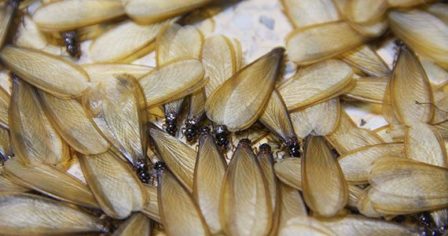Pest Control Expert – An Interview
In an effort to keep fresh perspective, we’ll be doing a series of “Expert Interviews.” Our first Expert is Barry Bradley, our Pest Control Supervisor.
Your name:
Barry Bradley
Your Job Title:
Pest Control Supervisor
 Qualifications?
Qualifications?
National Pest Management Association (NPMA) QualityPro; Associate Certified Entomologist (ACE)
How long have you been in the industry?
I began my career in Pest Control in 1992 and worked for 10 years as a technician and then service manager. There was a break from the field for 8 years because of an opportunity in full time pastoral ministry. I re-entered the business in 2010.
How did you become interested in the pest control field?
Even as a child I was always fascinated by bugs. Watching pavement ants in my back yard was a common past time and adventure for me. Spiders were never scary to me but were beautiful and easily attracted my attention. My favorite superhero was, and is to this very day, Spiderman.
What is the most common pest control issue you deal with locally?
The answer to this is definitely the Odorous House ant. They were not found in our area at all before the mid 1990’s but now they are the most prevalent ant species we deal with on a daily basis.
What is the most difficult pest control issue you deal with?
Once again the answer is the Odorous House Ant. This species colony size can vary from an average of around 10,000 members. There have been reports of colonies totaling 100,000 or more. They have multiple queen,s and will readily pick up and move their whole nest if the colony is disturbed. They can easily nest inside wall voids and will take advantage of food and water sources around the exterior and interior of your home. Ants from different colonies are not aggressive toward one another. This means you can easily have multiple colonies nesting at multiple points inside and outside your home. They invade, like separate armies attacking a common enemy for a unified purpose.
In terms of control, this pest does not respond well to pesticides that have an active ingredient with a repellent effect. These kinds of products can actually cause colonies to separate and invade at multiple points. This is where the” multiple queen factor” really comes in to play and the problem often becomes worse. This process is known as “budding” and usually happens when a homeowner tries to treat their property themselves.
What are some things you’d recommend the average home owner do to improve the pest situation in their home?
The first step is to identify obvious pest harborage areas around the exterior perimeter of your home. This could be items stored outside near the foundation such as trash cans, building materials, or gardening supplies and equipment. Also leaf litter, over grown plants or shrubs, and sometimes potted plants can provide an environment where pests can thrive.
The second step is to try to keep plants and shrubs trimmed back at least 8 to 10 inches away from your home’s foundation. This eliminates a “bridge” that pests can travel on from landscaping to the side of your home. It also allows better air flow and increased sunlight to soil, lessening the amount of moisture and making the area less attractive to pests.
The third step is to be aware of any high moisture areas around the exterior of your home. Clogged gutters, broken downspouts, and leaking faucets or garden hoses can all contribute to potential pest activity.
 What are some things you’d recommend homeowners NOT try to tackle themselves? In other words, when should they call a professional?
What are some things you’d recommend homeowners NOT try to tackle themselves? In other words, when should they call a professional?
Wood destroying insects such as termites, wood boring beetles, and carpenter ants are usually not a challenge a home owner should attempt to deal with themselves. These pests require specific knowledge, materials and application equipment to effectively control. Also, as I earlier mentioned Odorous House ants are extremely challenging just simply because of their vast numbers and home owners are not likely to be successful battling them on their own.
How would you recommend a homeowner locate a reputable pest control professional?
The National Pest Management Association QualityPro site is a great place to find reputable Pest Control companies that are members of the NPMA and have gone through the QualityPro training. Also, ask your friends that have pest control services and find out what their experience has been.
Any funny stories about your experiences in treating client properties that you’d like to share?
People can sometimes be really bad at insect identification. I was called out to one of my clients that is a large nursing home and they were convinced they had a bed bug problem. They saved a few specimens for me in a baggie and were anxiously awaiting my professional opinion. After examining the “bugs” for a moment or two it was obvious that their concern was over a booger, a small fragment of ear wax, and a piece of dirt. I killed all 3 of these “bug impersonators” and was on my way to the next client.
What’s most rewarding about your job?
My answer is two-fold: First is the people I have met and have come to know through the years. This includes managers I have worked for, technicians I have worked alongside of, technicians who I have had the privilege of supervising, and many other sales people, support staff, and other co-workers. It also includes the many, many clients over the years I have met and have gotten to know and who have done more than just welcoming me into their homes but in a sense have welcomed me into their lives. Countless clients have treated me as more than just a service person taking care of their pests but have called me a friend and even family. My life has been blessed as a result.
Second, I love the opportunity and challenge to solve client’s pest issues. Effective pest control work is similar to good detective work in that you need to have a trained eye to notice what is often unnoticed or unrecognized by others. Taking the time to locate the source of a pest issue or being able to recommend ways to lessen or eliminate conducive conditions attracting pests in the first place is a major key to success.
If you’d like to learn more about our suite of Pest Control services, we’d be happy to speak with you. Please Contact Us for more information.

